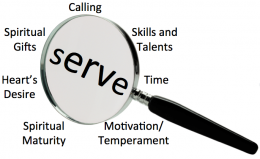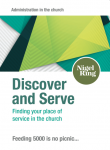 What is a Serving Profile?
What is a Serving Profile?
We shall be constructing a Profile which will provide the basis of a prayerful discussion with the two facilitators to help find a satisfying and fulfilling place to serve in the church. It has the seven elements we have been considering throughout this series:
• Skills/Talents
• Spiritual Gifts
• Calling
• Heart’s Desire
• Temperament
• Time
• Spiritual maturity
Skills and Talents
There is, of course, a huge range of possible skills and talents to consider; that is inevitable since we are made in the image of an infinite Creator! If you were to list all the types of employment people have in your church and then add their interests and recreational activities you would find an awesome variety of possibilities. In our church we have teachers, computer programmers, train drivers, postmen, doctors, social workers, office workers etc. The list goes on and on. Then there are some people who, in their recreational time, are very creative: dress-making, furniture building, gardening etc. Others are keen sportsmen and women: running, sailing, team games. I even have one friend who is fascinated by historical battles and will re-fight them with model soldiers! He is also a keen amateur actor which gives him much contact with unchurched people.
 So, as you come to the end of teaching the section on Skills and Talents you could either ask people to write down their particular skills and interests or give them a pre-prepared checklist to help them think through some options. On occasion I have used such a questionnaire and have given people the option of highlighting any new skills they would be interested in learning. This gives the potential of people training others to enrich their lives. In the book Discover and Serve I have included an extensive list as an appendix. This gives the options for people to offer to serve or to request training in a particular area. This book is available through the email address in the side panel for £5.99 + postage.
So, as you come to the end of teaching the section on Skills and Talents you could either ask people to write down their particular skills and interests or give them a pre-prepared checklist to help them think through some options. On occasion I have used such a questionnaire and have given people the option of highlighting any new skills they would be interested in learning. This gives the potential of people training others to enrich their lives. In the book Discover and Serve I have included an extensive list as an appendix. This gives the options for people to offer to serve or to request training in a particular area. This book is available through the email address in the side panel for £5.99 + postage.
Spiritual Gifts
This element of the Profile has taken the major part of this series; that is appropriate being the tool-kit God has particularly given to advance the kingdom. But the list of nearly thirty gifts is daunting and contains both those that are conspicuously ‘spiritual’, such as prophecy and word of knowledge, and others that have a lower profile and are thus less easily recognised, such as hospitality or the gift of mercy.
I have found that a pseudo-psychometric exercise can be helpful here. This is neither scientific nor rigorous but can help someone ‘home in’ on their particular gifts. It often helps people to recognise that although they may have thought they had little to offer they have in fact a very precious gift to contribute to helping other people; this is, after all, the main purpose of spiritual gifts. Gifts are given by God to edify and build up the church to be more effective in ministry.
The exercise consists of nearly 200 statements (which are also given in an appendix of the book) and people are asked to rate each one on a four-point scale according to how closely they feel it applies to them. Then through transferring these scores to a grid and totalling the results the top two or three gifts become identified. It is so encouraging to see people’s faces when they realise that gifts they may have taken for granted, such as encouragement, could in fact be significant indicators of how they can serve in the church. It also releases people from feeling that they need to be like someone else; there is no shame in not scoring highly on any particular gift or gift mix. God has provided others in the church to complement our gifts in the body of believers so that the majority of gifts are available to the church through the various members. Indeed, we can be confident that God has provided all that are needed to fulfil His mission for the church.
What Gifts do you think I have?
It is so important to help identify someone’s spiritual gifts that I use a second vehicle; this also brings strong encouragement and affirmation. I ask each person to hand a very easily completed leaflet to two close and trusted people – typically a spouse or close friends. In this leaflet there are six questions with simple explanations related to the person’s spiritual maturity and giftedness. This gives a very helpful external evaluation of a person’s spiritual gifts, whether these are well developed and regularly used or are still needing to be encouraged, in which case training in their use would be helpful.
We shall continue to consider this Serving Profile in the next posting.
